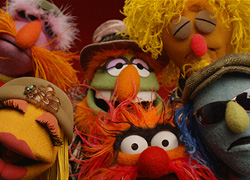A few things about a few movies...
Homeward Bound: The Incredible Journey
In this movie, the family has to move to San Francisco for a few weeks, and has to leave their pets with a friend who lives somewhere on the way there. The family planned to occasionally visit on weekends during that time (I used to think they were going back home when they planned to visit). However, after they hear that the pets had been located and they go to the animal shelter to pick them up, they seem to have gone back to their permanent home afterwards. Did the father's temporary job relocation just happen to suddenly end when the pets were found? Did he make arrangements with his boss to go back home?
Also, the pets don't realize that they were going to be without their owners for awhile (I used to think that they did, and that Shadow simply couldn't understand Peter on the phone telling him that they'll visit later than he had told him, leading to them running back), and eventually they decide to go home. How interesting is it that their owners just happened to be home by the time they got there? What if they had made it home when the owners were still out of town?
Billy Madison
Early on, when the father tells Billy that he's planning on letting Eric inherit the company instead of Billy, he tells him that now he doesn't have to look for a job. Why? If Billy got to own the company, he wouldn't have to look for a job because he'd have one, which until then had been guaranteed for him. So maybe his dad was still going to be spoiling him (maybe he should have told him he'd cut him off in addition to not letting him run the family business), but it seems like he wouldn't need to look for a job either way.
Baby's Day Out
When Baby Bink gets kidnapped, the robbers ransom note says "don't call the police". Why'd they do that, besides not wanting to be caught? I don't think the note says anything about what they'd do if the police were called. And the parents do call the police anyway.
And throughout the movie, they worry about not getting the ransom money when the baby escapes. Why not just go to where the money is supposed to be anyway? Yeah, I know Norby asks Eddie if they should just go and see if the money is there. And Eddie seems to figure out that they would most likely have the cops there when they collected it. Just because the baby's not with them?
 Welcome to the Muppet Central Forum!
Welcome to the Muppet Central Forum!
 Back to the Rock Season 2
Back to the Rock Season 2
 Sesame Street Season 54
Sesame Street Season 54
 The Muppets Mayhem premieres
The Muppets Mayhem premieres
 Bear arrives on Disney+
Bear arrives on Disney+
 Sam and Friends Book
Sam and Friends Book
 ) it tends to come off as a false statement that only suckers in... well... suckers. Sunny D did have vitamin C in it. I'd say that and the fact it doesn't give you gas.
) it tends to come off as a false statement that only suckers in... well... suckers. Sunny D did have vitamin C in it. I'd say that and the fact it doesn't give you gas.